Whenever a client is looking for resources for their new diagnosis, I have often been at a loss because there are so many to choose from. However, I have a long list of books I am eager to read and would like to share them to help find a starting place for clients hoping to gain information about neurodivergence outside of therapy. In this blog, I hope to offer you a few starting points for your research into neurodivergence, whether you are a loved one or someone who is neurodivergent or neurodivergent yourself. I have read some of these books, but not all of them. I am eager to read when I can for those I have not read.
Your Brains Not Broken: Strategies for Navigating Your Emotions and Life with ADHD by Tamara Rosier, PhD
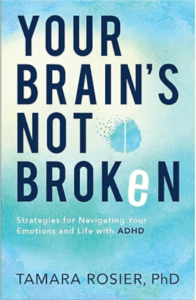 This is my most recommended book for any of my clients diagnosed or suspect they have ADHD. Not only is it a fast read, 208 pages or 6-hour audiobook listen, but it also covers many facets of ADHD. It is hard to find ADHD resources that only discuss the inattentive type or help with only one symptom of ADHD. In this book, Dr. Rosier talks about all the benefits and struggles an ADHD brain goes through and offers the reader insight and understanding. ADHD is a diagnosis, but it is also a superpower, and this book recognizes that. I highly recommend this book!
This is my most recommended book for any of my clients diagnosed or suspect they have ADHD. Not only is it a fast read, 208 pages or 6-hour audiobook listen, but it also covers many facets of ADHD. It is hard to find ADHD resources that only discuss the inattentive type or help with only one symptom of ADHD. In this book, Dr. Rosier talks about all the benefits and struggles an ADHD brain goes through and offers the reader insight and understanding. ADHD is a diagnosis, but it is also a superpower, and this book recognizes that. I highly recommend this book!
The ADHD Advantage: What You Thought Was Diagnosis May Be Your Greatest Strength by Dale Archer, MD
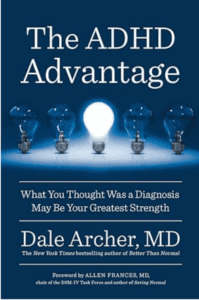 Whenever a client is looking for resources for their new diagnosis, I have often been at a loss because there are so many to choose from. However, I have a long list of books I am eager to read and would like to share them to help find a starting place for clients hoping to gain information about neurodivergence outside of therapy. In this blog, I hope to offer you a few starting points for your research into neurodivergence, whether you are a loved one or someone who is neurodivergent or neurodivergent yourself. I have read some of these books, but not all of them. I am eager to read when I can for those I have not read.
Whenever a client is looking for resources for their new diagnosis, I have often been at a loss because there are so many to choose from. However, I have a long list of books I am eager to read and would like to share them to help find a starting place for clients hoping to gain information about neurodivergence outside of therapy. In this blog, I hope to offer you a few starting points for your research into neurodivergence, whether you are a loved one or someone who is neurodivergent or neurodivergent yourself. I have read some of these books, but not all of them. I am eager to read when I can for those I have not read.
A Radical Guide for Women with ADHD: Embrace Neurodiversity, Live Boldly, and Break Through Barriers by Sari Solden, MS and Michelle Frank, PsD
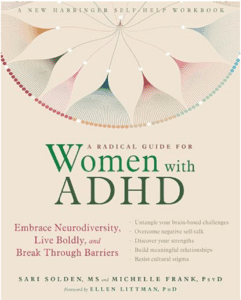
This book has been on my to-read list for quite some time. Women who are neurodivergent are often left confused when they are diagnosed with ADHD because it presents differently than how they experienced ADHD in the past. ADHD in women is also under-researched, and it feels like we are always catching up to help treat our clients. This book caught my eye because it is all about women, the emotional ramifications of ADHD for women, and what being untreated for so long is like. This book will provide ways to help tackle negative self-talk and shame so you can embrace your neurodivergence!
Unmasking Autism: Discovering the New Faces of Neurodiversity by Devon Price, PhD
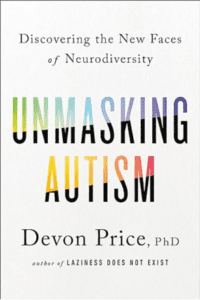 Like the other books in this blog, this is another book offering radical acceptances for themselves and their wonderfully neurodivergent brains. This book talks about masking, an ordinary coping skill for those on the spectrum, and while it keeps them safe, it often causes harm in many ways. This book is about radical acceptance and helps navigate ways to unmask and be authentic in every aspect! With the author sharing personal experiences, this is an excellent read about neurodivergence in a neurotypical world.
Like the other books in this blog, this is another book offering radical acceptances for themselves and their wonderfully neurodivergent brains. This book talks about masking, an ordinary coping skill for those on the spectrum, and while it keeps them safe, it often causes harm in many ways. This book is about radical acceptance and helps navigate ways to unmask and be authentic in every aspect! With the author sharing personal experiences, this is an excellent read about neurodivergence in a neurotypical world.
Self-Care for Autistic People: 100+ Ways to Recharge, De-Stress and Unmask! By Dr. Megan Anna Neff
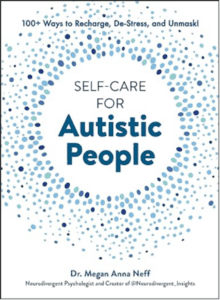 The final book is all about caring for your neurodivergent mind. It contains coping skills, unmasking, and tips for navigating a neurotypical world with a magical neurodivergent brain. This book takes you through common triggers, coping skills, and tricks to help with masking so you can be present and enjoy yourself as you are. It has everything from educating you on masking to helpful tools in the workplace, making it an excellent read for coping skill practice and ideas for care.
The final book is all about caring for your neurodivergent mind. It contains coping skills, unmasking, and tips for navigating a neurotypical world with a magical neurodivergent brain. This book takes you through common triggers, coping skills, and tricks to help with masking so you can be present and enjoy yourself as you are. It has everything from educating you on masking to helpful tools in the workplace, making it an excellent read for coping skill practice and ideas for care.

